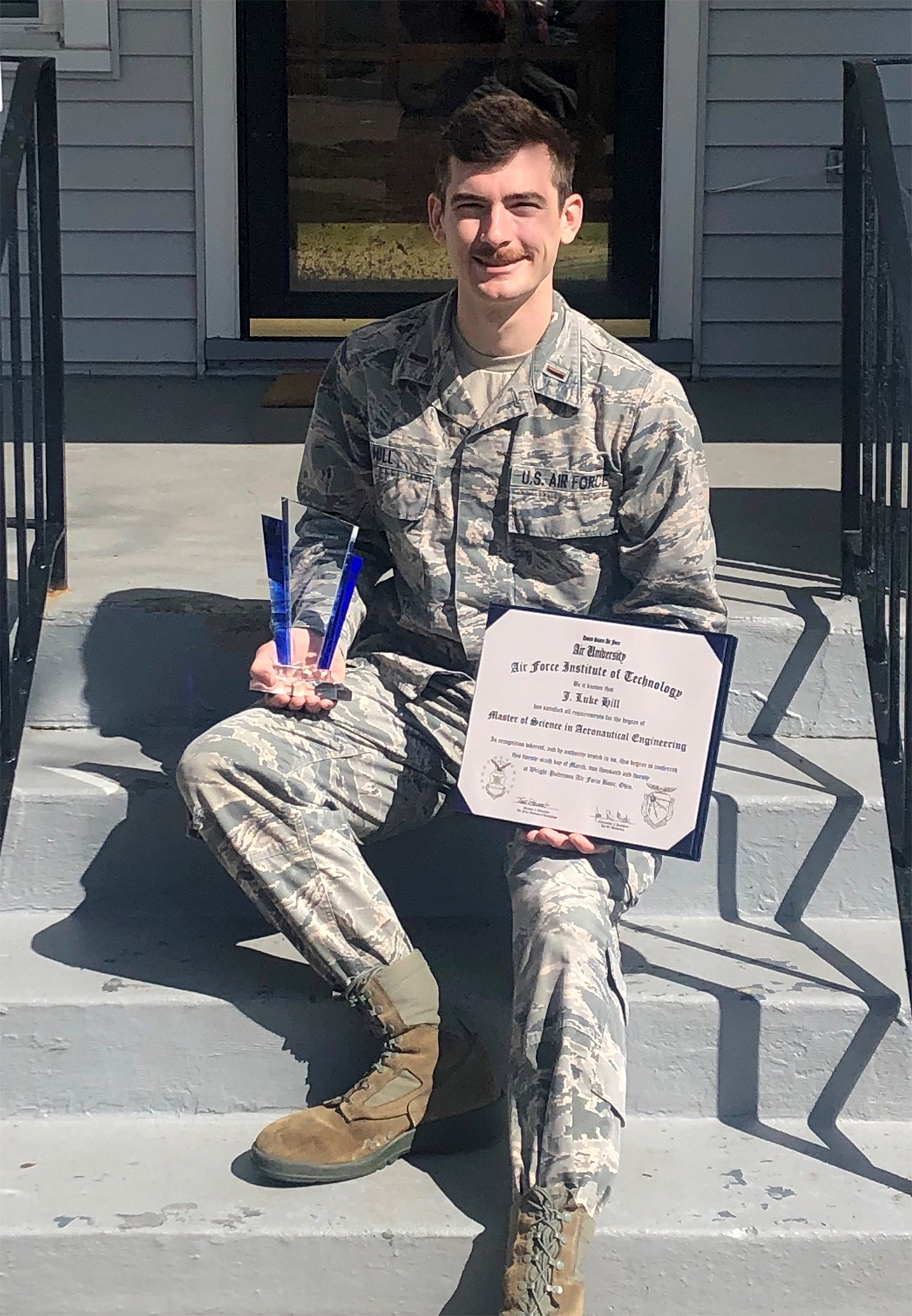AFRL researcher’s passion for hypersonics propels his success
WRIGHT-PATTERSON AIR FORCE BASE, Ohio (AFRL) – An AFRL researcher grew up with two parents who worked as pharmacists, so he was initially interested in medicine as a young student. Once he reached high school, though, his passion for mathematics blossomed, thanks to one of his high school teachers. This teacher showed him that math has real-world applications and he was excited to learn more.
1st Lt. Jonathan “Luke” Hill turned his enthusiasm for math into a career at the Air Force Research Laboratory, where he was able to put his problem-solving capabilities to the test as a hypersonic research engineer with AFRL’s Aerospace Systems Directorate, High Speed Systems Division at Wright-Patterson Air Force Base, Ohio.
Hill embarked on an educational journey to learn as much as he could about aeronautics. In December 2017, Hill completed his Bachelor’s degree in Aerospace Engineering from North Carolina State University, where he was commissioned as an active duty Air Force officer. His eagerness to learn more led him to earn his Master’s degree in Aeronautical Engineering from the Air Force Institute of Technology (AFIT) in March 2020, but he did not stop there. Hill is currently pursuing his Doctorate degree from AFIT, also in Aeronautical Engineering.
“My opening line during my thesis defense was ‘I love hypersonics,’” said Hill. “Of course, I got a chuckle out of the room for saying such a candid statement in such a formal setting with so many people present, but I was being genuine when I made that statement. I really do love hypersonics. Every moment I have spent over the past three years learning about the vast complexities of the field of hypersonic aerodynamics has only better served to humble my pride and grow my desire to discover more. The thing I am most proud of in my career is being able to contribute to our understanding of this field that I love.”
“He is a very personable, energetic, innovative and productive research engineer,” said Dr. Michael Brown, the Chief of the Hypersonic Sciences Branch. “He exemplifies the best attributes of young officers attacking technology gaps.”
Hill’s vivacious personality and quest for knowledge allows him to take on each task with enthusiasm. From planning themed parties for his family to taking on new research projects, Hill puts his heart into each task he takes on. He once hosted a murder mystery themed party for his wife’s birthday.
Whether he is solving cases for fun or delving into scientific research problems, Hill loves seeking solutions. This passion for research fuels his drive to be a successful hypersonics research engineer.
“I have been greatly blessed over the past year with my role in the directorate,” said Hill. “Ever since I was a sophomore in undergrad, I knew that I wanted to become involved in experimental aerodynamics and that I wanted to work on high-speed systems. I am now working in my dream job. I am in the unique position where I not only get hands-on in the wind tunnel research facility, but I also have been able to pursue my own research towards my Doctorate degree, furthering our understanding of high-speed phenomena. Having the ability to get out of the office and tackle real problems on physical hardware while also being able to complete research in a relevant field is a truly unique position for a young officer.”
Hill’s military career thus far has been full of new adventures. Although Hill will be medically discharged in July 2021, he has packed a lifetime of experience into just a few, short years as an Air Force officer.
“I entered the service to do just that – serve,” said Hill. “I have been blessed with so many great opportunities in my short career and I intend to use those opportunities to better aid others. While I won’t be an active duty member much longer, I plan to continue my service in other capacities and hope to be able to also become more involved in my local community here around Wright-Patterson Air Force Base.”
Although Hill may not be an active duty servicemember much longer, he will continue to make an impact on the future of the Air Force.
“As I am sure many will already know, the field of hypersonics is one of the most pressing and important research areas of today,” said Hill. “I can proudly say that the research I have been able to complete and support in my research facility is working toward solving the problems of tomorrow. Our research is pushing the boundaries of our understanding and I often feel like we are writing the next chapters of aerodynamic textbooks. The work I perform allows me to provide insight to the Air Force into the behavior of critical aerodynamic systems and how they should be designed.”
Hill exemplifies the innovative, forward-thinking spirit of AFRL. His efforts throughout his military career will allow the operational warfighter to become more dynamic for future generations.

1st Lt. Jonathan “Luke” Hill, a researcher with AFRL, poses with his Dean’s List certificate he earned while attending the Air Force Institute of Technology at Wright-Patterson Air Force Base, Ohio. (Courtesy photo)
